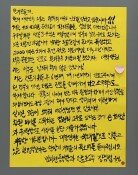Opening new chapter of cooperative politics
Opening new chapter of cooperative politics
Posted August. 18, 2018 07:15,
Updated August. 18, 2018 07:15
Floor leaders of three parliamentary negotiating blocs agreed Friday to combine “the regulation free zone act” and the “revision bill to the special regulations act for the special regional development districts,” one of the five “Regulation Sand Box” bills, and to deliberate it at the plenary session on August 30. The first step to passing deregulation bills has thus been taken just one day after President Moon Jae-in met with the floor leaders of five political parties at the presidential office. Regarding claims that this move constitutes violation of Moon’s presidential election pledges, the presidential office immediately stated, “This is part of our efforts to pass deregulatory measures that the Moon Jae-in administration is pushing to implement,” saying that it respects agreement reached by the rival parties. It is very meaningful that the presidential office and the rival parties have jointly taken the first non-partisan step to pursue deregulation.
The regulation-free zone act was one of major deregulation bills that the former Park Geun-hye administration sought to implement. The act is designed to promote certain industries for respective regions, and drastically ease related regulations. The ruling Democratic Party, which opposed the bill by labeling it “Special Chaebol Benefit Act” as the main opposition party in the past, has continuously opposed the bill even after taking power, as if it felt burden from adopting the former administration’s brand. Instead, the ruling party put forward the concept of “Regulation Sand Box,” under which the government would allow companies to start new business without facing any regulations, as if children are freely playing on sand on the beach, and revise rules only if problems arise later. The regulation-free zone act and the “special regional district act” are not different each other in that they both aim to drastically remove regulations, but the ruling and opposition parties have been wrangling over the issue of which parliamentary standing committee will review the acts and which name of the acts to use.
The local elections took place this year, but the National Assembly has wasted time without generating any productive outcome over the past seven months except the approval of an extra state budget, and the act on independent counsel for the “Druking” (power blogger behind online rigging) scandal. The parties should hold the August extraordinary session of the National Assembly with robust determination. For one thing, it is fortunate that the rival parties agreed to review the special act to ease the rule on separation of bank and industrial businesses, and the regulation-free zone act. As for the basic act on service industry development, which the main opposition Liberty Korea Party is pursuing, the Democratic Party remains opposed, saying that the health and healthcare industry should be excluded from the act. However, since President Moon has urged day after day deregulation including introduction of telemedicine, even ruling party members are apparently moving to choose pragmatism to ideology. The rival parties should find a breakthrough for the basic act on service industry development sooner rather than later as well.
Advanced countries including the United States, Germany, and France are following policy directions that are neither conservative nor progressive in recent years. It is all about jobs. No task is more urgent than deregulation in the country’s effort to find new growth engine and create jobs. Deregulation is a extremely challenging path to take, which requires overcoming of opposition by various interest groups and supporters. Unless the ruling and opposition parties join forces, it is a mission that is impossible to achieve. It is hoped that rival parties open a new chapter of cooperative politics in which they take care of people’s difficult livelihood as priority by using deregulation as a catalyst.
Headline News
- Med professors announce intention to leave hospitals starting Thursday
- Bridge honoring Sgt. Moon Jae-sik unveiled in Pennsylvania
- Chief of Staff Chung tells presidential secretaries to stay away from politics
- US FTC bans noncompete agreements
- N. Korea launches cyberattacks on S. Korea's defense companies







